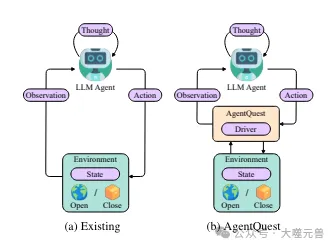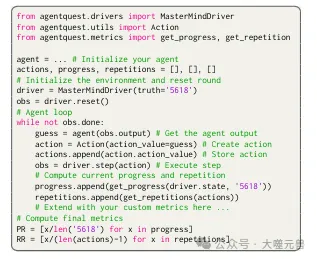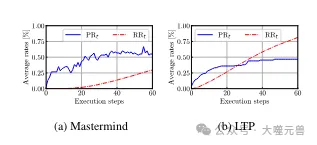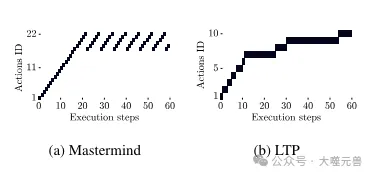 Technology peripherals
Technology peripherals
 AI
AI
 Exploring the boundaries of agents: AgentQuest, a modular benchmark framework for comprehensively measuring and improving the performance of large language model agents
Exploring the boundaries of agents: AgentQuest, a modular benchmark framework for comprehensively measuring and improving the performance of large language model agents
Exploring the boundaries of agents: AgentQuest, a modular benchmark framework for comprehensively measuring and improving the performance of large language model agents
Based on the continuous optimization of large models, LLM agents - these powerful algorithmic entities have shown the potential to solve complex multi-step reasoning tasks. From natural language processing to deep learning, LLM agents are gradually becoming the focus of research and industry. They can not only understand and generate human language, but also formulate strategies, perform tasks in diverse environments, and even use API calls and coding to Build solutions.
In this context, the introduction of the AgentQuest framework is a milestone. It not only provides a modular benchmarking platform for the evaluation and progress of LLM agents, but also Its easily extensible API provides researchers with a powerful tool to track and improve the performance of these agents at a more granular level. The core of AgentQuest lies in its innovative evaluation indicators-progress rate and repetition rate, which can reveal the behavior pattern of the agent in solving tasks, thereby guiding the optimization and adjustment of the architecture.
"AgentQuest: A Modular Benchmark Framework to Measure Progress and Improve LLM Agents" was written by a diverse research team from NEC European Laboratories, Politecnico di Torino University and the University of Saint Cyril and Methodius. This paper will be presented at the 2024 conference of the North American Chapter of the Association for Computational Linguistics (NAACL-HLT 2024), marking the team’s research results in the field of human language technology have been recognized by peers, not only for the value of the AgentQuest framework The recognition is also an affirmation of the future development potential of LLM agents.
The AgentQuest framework is a tool for measuring and improving the capabilities of large language model (LLM) agents. Its main contribution is to provide a modular and scalable benchmark testing platform. This platform can not only evaluate the performance of an agent on a specific task, but also reveal the behavior pattern of the agent in the process of solving the problem by showing the behavior pattern of the agent in the process of solving the problem. The advantage of AgentQuest is its flexibility and openness, which allows researchers to customize benchmarks according to their needs, thereby promoting the development of LLM agent technology.
AgentQuest Framework Overview
The AgentQuest framework is an innovative research tool designed to measure and improve large-scale language model (LLM) agents performance. It enables researchers to systematically track an agent's progress in performing complex tasks and identify potential areas for improvement by providing a modular series of benchmarks and evaluation metrics.
AgentQuest is a modular framework that supports multiple benchmarks and agent architectures. It introduces two new metrics - progress rate and repeat rate - to evaluate the performance of agent architectures. Behavior. This framework defines a standard interface for connecting arbitrary agent architectures to a diverse set of benchmarks and calculating progress and repetition rates from them.
In AgentQuest, four benchmark tests have been included: ALFWorld, Lateral Thinking Puzzles, Mastermind and Digital Solitude. In addition, AgentQuest also introduces new tests. You can easily add additional benchmarks without making changes to the agents under test.
 Picture
Picture
Figure 1: Overview of the baseline interaction of agents in the current framework AgentQuest. AgentQuest defines a common interface for interacting with benchmarks and calculating progress metrics, simplifying the addition of new benchmarks and allowing researchers to evaluate and test their agent architectures.
Basic composition and functionality
The core of the AgentQuest framework is its modular design, which allows researchers to add or modify benchmarks as needed. This flexibility is achieved by separating benchmarks and evaluation metrics into independent modules, each of which can be developed and optimized independently. The main components of the framework include:
Benchmark modules: These are predefined tasks that the agent must perform. They range from simple word games to complex logic puzzles.
Evaluation indicator module: Provides a set of tools to quantify agent performance, such as progress rate and repetition rate. These indicators help researchers understand the behavior pattern of agents in tasks.
API interface: allows researchers to connect their own agent architectures with the AgentQuest framework, as well as interact with external data sources and services.
The Importance of Modular Benchmarks and Metrics
A key advantage of modular benchmarks is that they provide a standardized way to evaluate the performance of different agents. performance. This means researchers can compare results from different agents under the same conditions, ensuring consistency and comparability of results. In addition, the modular design also allows researchers to tailor benchmarks to the needs of specific studies, which is often difficult to achieve in traditional benchmarking frameworks.
Evaluation metrics are equally important as they provide deep insights into the agent’s performance. For example, progress rate can show how efficient an agent is in solving a task, while repetition rate reveals whether an agent gets stuck in repetitions on certain steps, which could indicate a need to improve the decision-making process.
The scalability of AgentQuest
The API interface of AgentQuest is the key to its scalability. Through the API, researchers can easily integrate AgentQuest into existing research workflows, whether adding new benchmarks, evaluation metrics, or connecting to external data sources and services. This scalability not only accelerates the iterative process of research, but also promotes interdisciplinary collaboration, as experts from different fields can work together to solve common research questions using the AgentQuest framework.
The AgentQuest framework provides a powerful platform for the research and development of LLM agents through its modular benchmarking and evaluation metrics, as well as its extensibility through APIs. It not only promotes the standardization and replicability of research, but also paves the way for future innovation and collaboration of intelligent agents.
Benchmarking and Evaluation Metrics
In the AgentQuest framework, benchmarking is a key component to evaluate the performance of LLM agents. These tests not only provide a standardized environment to compare the abilities of different agents, but can also reveal the behavior patterns of agents when solving specific problems.
AgentQuest exposes a single unified Python interface, namely the driver and two classes that reflect the components of the agent-environment interaction (i.e. observations and actions). The observation class has two required properties: (i) output, a string reporting information about the state of the environment; (ii) completion, a boolean variable indicating whether the final task is currently completed. Action classes have one required attribute, action value. This is the string output directly by the agent. Once processed and provided to the environment, it triggers changes to the environment. To customize interactions, developers can define optional properties.
Mastermind Benchmark
Mastermind is a classic logic game where players need to guess a hidden color code. In the AgentQuest framework, this game is used as one of the benchmarks, where the agent is tasked with determining the correct code through a series of guesses. After each guess, the environment provides feedback, telling the agent how many were correct in color but in wrong position, and how many were correct in both color and position. This process continues until the agent guesses the correct code or reaches a preset limit of steps.
 Figure 2: Here we provide an example of how Mastermind implements interaction.
Figure 2: Here we provide an example of how Mastermind implements interaction.
Sudoku Benchmark
Sudoku is another popular logic puzzle that requires players to fill in numbers in a 9x9 grid, Make the numbers in each row, column and each 3x3 subgrid unique. In the AgentQuest framework, Sudoku is used as a benchmark to evaluate an agent's capabilities in spatial reasoning and planning. The agent must generate efficient number-filling strategies and solve the puzzle within a limited number of moves.
Evaluation Metrics: Progress Rate and Repeat Rate
AgentQuest introduces two new evaluation metrics: Progress Rate (PR) and Repeat Rate (RR). The progress rate is a value between 0 and 1 that measures the agent's progress in completing a task. It is calculated by dividing the number of milestones reached by the agent by the total number of milestones. For example, in the Mastermind game, if the agent guesses two correct colors and locations out of a total of four guesses, the progress rate is 0.5.
Repetition rate measures the tendency of an agent to repeat the same or similar actions during the execution of a task. When calculating the repetition rate, all previous actions of the agent are taken into account and a similarity function is used to determine whether the current action is similar to previous actions. Repetition rate is calculated by dividing the number of reps by the total number of reps (minus the first step).
Evaluate and improve LLM agent performance through metrics
These metrics provide researchers with a powerful tool for analysis and Improve the performance of LLM agents. By observing progress rates, researchers can understand how efficient an agent is at solving a problem and identify possible bottlenecks. At the same time, the analysis of repetition rates can reveal possible problems in the decision-making process of the agent, such as over-reliance on certain strategies or lack of innovation.
 Table 1: Overview of benchmarks available in AgentQuest.
Table 1: Overview of benchmarks available in AgentQuest.
In general, the benchmark testing and evaluation indicators in the AgentQuest framework provide a comprehensive evaluation system for the development of LLM agents. Through these tools, researchers can not only evaluate the current performance of agents, but also guide future improvement directions, thus promoting the application and development of LLM agents in various complex tasks.
Application Cases of AgentQuest
Practical application cases of the AgentQuest framework provide an in-depth understanding of its functionality and effectiveness, through Mastermind and other benchmarks Testing, we can observe the performance of LLM agents in different scenarios and analyze how to improve their performance through specific strategies.
Mastermind application case
In the Mastermind game, the AgentQuest framework is used to evaluate the logical reasoning ability of the agent. The agent needs to guess a hidden code consisting of numbers, and after each guess, the system provides feedback indicating the number and location of the correct number. Through this process, the agent learns how to adjust its guessing strategy based on feedback to achieve its goals more efficiently.
In practical applications, the initial performance of the agent may not be ideal, and the same or similar guesses are often repeated, resulting in a high repetition rate. However, by analyzing data on progress and repetition rates, researchers can identify shortcomings in the agent's decision-making process and take steps to improve it. For example, by introducing a memory component, the agent can remember previous guesses and avoid repeating ineffective attempts, thereby improving efficiency and accuracy.
Application cases of other benchmarks
In addition to Mastermind, AgentQuest also includes other benchmarks such as Sudoku, word games and logic puzzles, etc. . In these tests, the agent's performance is also affected by progress rate and repetition rate metrics. For example, in the Sudoku test, the agent needs to fill in a 9x9 grid so that the numbers in each row, each column, and each 3x3 subgrid are not repeated. This requires the agent to have spatial reasoning capabilities and strategic planning capabilities.
During these tests, the agent may encounter different challenges. Some agents may be excellent at spatial reasoning but deficient in strategy planning. Through the detailed feedback provided by the AgentQuest framework, researchers can identify problem areas in a targeted manner and improve the overall performance of the agent through algorithm optimization or adjustment of training methods.
The impact of memory components
The addition of memory components has a significant impact on the performance of the agent. In the Mastermind test, after adding the memory component, the agent was able to avoid repeating invalid guesses, thereby significantly reducing the repetition rate. This not only increases the speed at which the agent solves problems, but also increases the success rate. In addition, the memory component also enables the agent to learn and adapt faster when faced with similar problems, thereby improving its learning efficiency in the long term.
Overall, the AgentQuest framework provides a powerful tool for performance evaluation and improvement of LLM agents by providing modular benchmarking and evaluation metrics. Through the analysis of actual application cases, we can see that by adjusting strategies and introducing new components, such as memory modules, the performance of the agent can be significantly improved.
Experimental setup and result analysis
In the experimental setup of the AgentQuest framework, the researchers adopted a reference architecture based on a ready-made chat agent, consisting of Large language model (LLM) drivers such as GPT-4. This architecture was chosen because it is intuitive, easily extensible, and open source, which allows researchers to easily integrate and test different agent strategies.
 Picture
Picture
Figure 4: Average progress rate PRt and repetition rate RRt for Mastermind and LTP. Mastermind: RRt is low at first, but will increase after step 22, while the progress will also stop at 55%. LTP: Initially, higher RRt allows agents to succeed by making small changes, but later this levels off.
Experimental setup
The experimental setup included multiple benchmarks, such as Mastermind and ALFWorld, each designed to evaluate the agent performance in specific areas. The maximum number of execution steps is set in the experiment, usually 60 steps, to limit the number of attempts the agent can try when solving the problem. This limitation simulates the situation of limited resources in the real world and forces the agent to find the most effective solution in limited attempts.
Experimental result analysis
In the Mastermind benchmark test, the experimental results show that the repetition rate of the agent without a memory component is Relatively high, the rate of progress is also limited. This shows that agents tend to get stuck repeating invalid guesses when trying to solve problems. However, when the memory component was introduced, the agent's performance was significantly improved, with the success rate increasing from 47% to 60% and the repetition rate dropping to 0%. This shows that the memory component is crucial to improve the efficiency and accuracy of the agent.
 Picture
Picture
Figure 5: Example of repeated operations in Mastermind and LTP. Mastermind: Starts out with a series of unique moves, but then gets stuck repeating the same moves over and over again. LTP: Repeated actions are small variations on the same problem that lead to progress.
In the ALFWorld benchmark, the agent needs to explore a textual world to locate objects. Experimental results show that although the agent limited action repetitions while exploring the solution space (RR60 = 6%), it failed to solve all games (PR60 = 74%). This difference may be due to the fact that the agent requires more exploration steps when discovering objects. When extending the benchmark run time to 120 steps, both success and progress rates improved, further confirming AgentQuest's usefulness in understanding agent failures.
Adjustment of the agent architecture
According to the indicators of AgentQuest, researchers can adjust the agent architecture. For example, if an agent is found to have a high repetition rate on a certain benchmark, its decision-making algorithm may need to be improved to avoid repeating ineffective attempts. Likewise, if the rate of progress is low, the agent's learning process may need to be optimized to more quickly adapt to the environment and find solutions to problems.
The experimental setup and evaluation metrics provided by the AgentQuest framework provide in-depth insights into the performance of LLM agents. By analyzing experimental results, researchers can identify an agent's strengths and weaknesses and adjust the agent's architecture accordingly to improve its performance in a variety of tasks.
Discussion and future work
The proposal of the AgentQuest framework opens up new avenues for the research and development of large language model (LLM) agents. the way. It not only provides a systematic method to measure and improve the performance of LLM agents, but also promotes the research community's in-depth understanding of agent behavior.
AgentQuest’s potential impact in LLM agent research
AgentQuest enables researchers to More accurately measure the progress and efficiency of LLM agents on specific tasks. This precise assessment capability is critical for designing more efficient and intelligent agents. As LLM agents are increasingly used in various fields, from customer service to natural language processing, the in-depth analysis tools provided by AgentQuest will help researchers optimize the agent's decision-making process and improve its performance in practical applications.
AgentQuest’s role in promoting transparency and fairness
Another important contribution of AgentQuest is to increase the transparency of LLM agent research. Through public evaluation metrics and replicable benchmarks, AgentQuest encourages the practice of open science, making research results easier to verify and compare. Additionally, the modular nature of AgentQuest allows researchers to customize benchmarks, meaning tests can be designed for different needs and contexts, promoting diversity and inclusion in research.
Future development of AgentQuest and possible contributions from the research community
Keeping up with the advancement of technology, the AgentQuest framework is expected to continue to be expanded and improved. With the addition of new benchmarks and evaluation indicators, AgentQuest will be able to cover more types of tasks and scenarios, providing a more comprehensive perspective for the evaluation of LLM agents. In addition, with the advancement of artificial intelligence technology, AgentQuest may also integrate more advanced functions, such as the ability to automatically adjust the agent architecture to achieve more efficient performance optimization.
The research community’s contributions to AgentQuest are also integral to its development. The open source nature means researchers can share their improvements and innovations, accelerating the advancement of the AgentQuest framework. At the same time, feedback and practical experience from the research community will help AgentQuest better meet the needs of practical applications and promote the development of LLM agent technology.
Reference: https://arxiv.org/abs/2404.06411
The above is the detailed content of Exploring the boundaries of agents: AgentQuest, a modular benchmark framework for comprehensively measuring and improving the performance of large language model agents. For more information, please follow other related articles on the PHP Chinese website!

Hot AI Tools

Undresser.AI Undress
AI-powered app for creating realistic nude photos

AI Clothes Remover
Online AI tool for removing clothes from photos.

Undress AI Tool
Undress images for free

Clothoff.io
AI clothes remover

AI Hentai Generator
Generate AI Hentai for free.

Hot Article

Hot Tools

Notepad++7.3.1
Easy-to-use and free code editor

SublimeText3 Chinese version
Chinese version, very easy to use

Zend Studio 13.0.1
Powerful PHP integrated development environment

Dreamweaver CS6
Visual web development tools

SublimeText3 Mac version
God-level code editing software (SublimeText3)

Hot Topics
 1377
1377
 52
52
 Do mysql need to pay
Apr 08, 2025 pm 05:36 PM
Do mysql need to pay
Apr 08, 2025 pm 05:36 PM
MySQL has a free community version and a paid enterprise version. The community version can be used and modified for free, but the support is limited and is suitable for applications with low stability requirements and strong technical capabilities. The Enterprise Edition provides comprehensive commercial support for applications that require a stable, reliable, high-performance database and willing to pay for support. Factors considered when choosing a version include application criticality, budgeting, and technical skills. There is no perfect option, only the most suitable option, and you need to choose carefully according to the specific situation.
 How to use mysql after installation
Apr 08, 2025 am 11:48 AM
How to use mysql after installation
Apr 08, 2025 am 11:48 AM
The article introduces the operation of MySQL database. First, you need to install a MySQL client, such as MySQLWorkbench or command line client. 1. Use the mysql-uroot-p command to connect to the server and log in with the root account password; 2. Use CREATEDATABASE to create a database, and USE select a database; 3. Use CREATETABLE to create a table, define fields and data types; 4. Use INSERTINTO to insert data, query data, update data by UPDATE, and delete data by DELETE. Only by mastering these steps, learning to deal with common problems and optimizing database performance can you use MySQL efficiently.
 Navicat's method to view MongoDB database password
Apr 08, 2025 pm 09:39 PM
Navicat's method to view MongoDB database password
Apr 08, 2025 pm 09:39 PM
It is impossible to view MongoDB password directly through Navicat because it is stored as hash values. How to retrieve lost passwords: 1. Reset passwords; 2. Check configuration files (may contain hash values); 3. Check codes (may hardcode passwords).
 Does mysql need the internet
Apr 08, 2025 pm 02:18 PM
Does mysql need the internet
Apr 08, 2025 pm 02:18 PM
MySQL can run without network connections for basic data storage and management. However, network connection is required for interaction with other systems, remote access, or using advanced features such as replication and clustering. Additionally, security measures (such as firewalls), performance optimization (choose the right network connection), and data backup are critical to connecting to the Internet.
 How to optimize MySQL performance for high-load applications?
Apr 08, 2025 pm 06:03 PM
How to optimize MySQL performance for high-load applications?
Apr 08, 2025 pm 06:03 PM
MySQL database performance optimization guide In resource-intensive applications, MySQL database plays a crucial role and is responsible for managing massive transactions. However, as the scale of application expands, database performance bottlenecks often become a constraint. This article will explore a series of effective MySQL performance optimization strategies to ensure that your application remains efficient and responsive under high loads. We will combine actual cases to explain in-depth key technologies such as indexing, query optimization, database design and caching. 1. Database architecture design and optimized database architecture is the cornerstone of MySQL performance optimization. Here are some core principles: Selecting the right data type and selecting the smallest data type that meets the needs can not only save storage space, but also improve data processing speed.
 HadiDB: A lightweight, horizontally scalable database in Python
Apr 08, 2025 pm 06:12 PM
HadiDB: A lightweight, horizontally scalable database in Python
Apr 08, 2025 pm 06:12 PM
HadiDB: A lightweight, high-level scalable Python database HadiDB (hadidb) is a lightweight database written in Python, with a high level of scalability. Install HadiDB using pip installation: pipinstallhadidb User Management Create user: createuser() method to create a new user. The authentication() method authenticates the user's identity. fromhadidb.operationimportuseruser_obj=user("admin","admin")user_obj.
 Can mysql workbench connect to mariadb
Apr 08, 2025 pm 02:33 PM
Can mysql workbench connect to mariadb
Apr 08, 2025 pm 02:33 PM
MySQL Workbench can connect to MariaDB, provided that the configuration is correct. First select "MariaDB" as the connector type. In the connection configuration, set HOST, PORT, USER, PASSWORD, and DATABASE correctly. When testing the connection, check that the MariaDB service is started, whether the username and password are correct, whether the port number is correct, whether the firewall allows connections, and whether the database exists. In advanced usage, use connection pooling technology to optimize performance. Common errors include insufficient permissions, network connection problems, etc. When debugging errors, carefully analyze error information and use debugging tools. Optimizing network configuration can improve performance
 Does mysql need a server
Apr 08, 2025 pm 02:12 PM
Does mysql need a server
Apr 08, 2025 pm 02:12 PM
For production environments, a server is usually required to run MySQL, for reasons including performance, reliability, security, and scalability. Servers usually have more powerful hardware, redundant configurations and stricter security measures. For small, low-load applications, MySQL can be run on local machines, but resource consumption, security risks and maintenance costs need to be carefully considered. For greater reliability and security, MySQL should be deployed on cloud or other servers. Choosing the appropriate server configuration requires evaluation based on application load and data volume.



